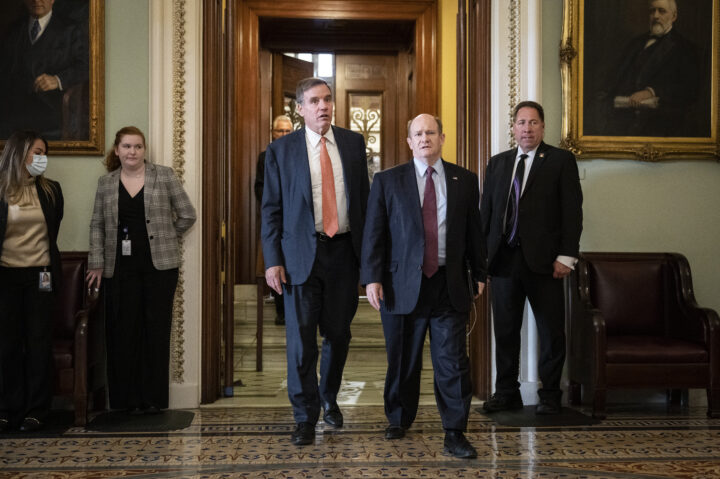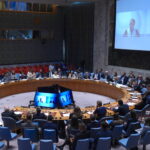Coons: ‘Having Iran on its back foot and having the Iranian enrichment progress halted is something I'm not going to criticize’

Drew Angerer/Getty Images
Sen. Mark Warner (D-VA) and Sen. Chris Coons (D-DE) leave the Senate floor and walk to a luncheon with Senate Democrats at the U.S. Capitol on June 15, 2021 in Washington, DC.
ASPEN, Colo. — Sen. Chris Coons (D-DE) said Friday that the U.S. strikes on Iran could ultimately produce a positive outcome, a softening of the Delaware senator’s previous skepticism.
“The strike on Iran is one that I disagreed with because of the process, the lack of consultation with Congress, the partisan way that Republicans were notified at the most senior levels [and]Democrats were not,” Coons said at the Aspen Security Forum.
He said he also had not expected that the administration would be able to avoid significant Iranian retaliation and an escalating conflict.
“I frankly, did not believe that we would end up in the period we seem to be in where a counter-strike by Iran against American soldiers and interests has not yet come,” Coons continued.
But, he said, “if it actually ends up securing a movement towards regional peace and really knocking down Iran’s nuclear enrichment program, it’s a good thing. I mean, having Iran on its back foot and having the Iranian enrichment progress halted is something I’m not going to criticize.”
Coons added that he is concerned that the administration lacks a clear plan for the path forward or the commitment to sustain pressure on Israeli Prime Minister Benjamin Netanyahu to end the war in Gaza and pursue “Saudi-Israeli-Palestinian reconciliation and recognition.”
Sen. Mark Warner (D-VA), speaking alongside Coons, argued that President Donald Trump had overplayed the strikes’ effectiveness and missed the opportunity to capitalize on them.
“I would also grant on the Iran strike that I had the same concerns, and I was Gang of Eight and did not get told,” Warner said, referring to the group of eight senior congressional leaders who are traditionally briefed on important intelligence matters by the executive branch. “In [Trump’s] effort to claim total credit, he turned something that was a success, but by saying within two hours ‘total obliteration’ when we didn’t even try to fully take out all the enriched uranium [storage] sites set a standard that was too high.”
“Setting Iran back dramatically was important,” Warner said. “But then you had everybody trying to kowtow to this level that is unattainable unless you have troops on the ground.”
He said the only way to ensure Iran’s nuclear program won’t continue is to reach a deal to allow nuclear inspectors back into the country, and that he expected Trump was pursuing that path after the strikes, but “it feels like that moment has already passed.”
The two Democratic senators also spoke about their concerns about the upcoming 2026 appropriations process, and Office of Management and Budget Director Russ Vought’s recently reported comments that he wanted to see the process be less bipartisan. They raised concerns that Republicans would seek to walk back bipartisan appropriations deals through recissions down the road.
Warner, the vice chair of the Senate Intelligence Committee, railed against Director of National Intelligence Tusli Gabbard as untrustworthy and “not competent,” accusing her of politicizing the intelligence community and mishandling classified information. He said he believes that close intelligence partners are curtailing their information-sharing with the U.S. due to concerns about Gabbard and the Trump administration.
Addressing the Signalgate scandal, when top administration officials discussed operational plans against the Houthis in Yemen on an unsecured private messaging app, Warner said “the Israeli government was extraordinarily upset” about the incident.






























































